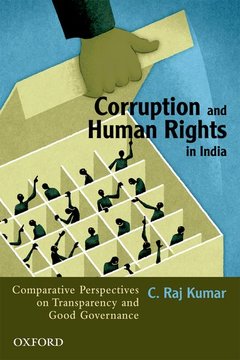Description
Corruption and human rights in india: comparative perspectives on transparency and good governance
Comparative Perspectives on Transparency and Good Governance
Author: Kumar C. Raj
Language: English
Approximative price 33.63 €
In Print (Delivery period: 14 days).
Add to cart
Publication date: 09-2011
212 p. · 14.8x22.8 cm · Hardback
212 p. · 14.8x22.8 cm · Hardback
Description
/li>Contents
/li>Biography
/li>
Corruption in India has become a growing and pervasive concern. It undermines not only the democratic institutions, but also the social fabric, political and bureaucratic structure of the Indian society. This book examines corruption from a human rights perspective. It differentiates between two approaches to dealing with corruption, the criminal law enforcement approach to recognizing criminal culpability and the human rights approach to seeking accountability for corruption. Relying on the latter, it analyses corrupt practices that lead to violation of constitutional rights of individuals. In order to address the systemic inefficiencies in dealing with the problem, this work suggests key legislative and institutional reforms. It also critically examines the present anti-corruption framework, and legislative and institutional measures taken by various governments. Advocating accountability and transparency in governance, this book critically focuses on the right to information and the working of central and state information commissions. It compares India's experience with some other developing countries in South Asia. This book will interest lawyers, policymakers, activists, and journalists. It will be useful for teachers and researchers in the area of law, political science, and sociology.
Acknowledgements. Foreword by Justice V.R. Krishna Iyer. Introduction. 1. Corruption and its Impact on Human Rights. 2. Corruption and its Consequences for Governance in Asia: A Comparative Perspective. 3. Existing Framework for Combating Corruption in India. 4. New Legislative and Institutional Reforms for Eliminating Corruption in India. 5. The Way Forward: Establishing and Independent Commission Against Corruption. Index.
C. Raj Kumar is Professor and Vice Chancellor, O.P. Jindal Global University; and Dean, Jindal Global Law School. He is also Consultant to the National Human Rights Commission in India. Also, former Consultant at UN University, Tokyo; UNDP; International Council for Human Rights Policy, Geneva. Also taught at the School of Law of City University of Hong Kong.
© 2024 LAVOISIER S.A.S.




